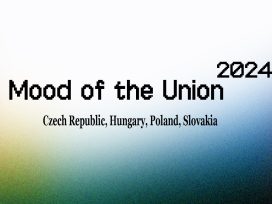Cheeky acquaintance of the twentieth century though he may have been, he still did not become a full-time, paid-up contemporary. Nor did he become a professional émigré leader or a Franco-Hungarian Nestor, claiming the respect due to someone of his advanced years. His adopted homeland can be proud in taking leave of him; with the death of Ferenc Fejtö, we Hungarians have lost one of the better parts of ourselves.
Fejtö was a self-confessed autobiographical author, both as a writer and a historian. In his earliest works he explored the “primeval forest” of his patrimony, that rapidly bourgeoisifying, ethnically and culturally diverse community within a Danubian monarchy that had meanwhile disintegrated. Later too he remained a sage scholar of this history-freighted region – by now from a distance, though never passing up frequent contacts.
Born Ferenc Fischl, he spent his boyhood years in Nagykanizsa and Zagreb, and he was still a young boy when he experienced at first hand the winding up of the workaday liberalism of the vanished Austro-Hungarian monarchy. Later, the deplorable legal provision of 1920 known as the “Numerus Clausus”, which imposed strict quotas on the numbers of students of Jewish descent admitted to institutions of higher learning in Hungary, cast a large shadow on the start of his own university education. It was not so much that indignity alone, much more an ingrained sense of justice that led him into political activism on the Left. That goes without saying: any open-minded and upright young man in the 1930s was almost bound to seek his way to the left of the ideology of the Horthy regime. Nor were the administrative consequences long in coming: Fejtö was arrested on charges of Marxist agitation, received the obligatory beating to extort a confession, and eventually was sentenced to one year in prison.
In parallel with his introduction to politics and prison, Fejtö also made his debut before the literary public. Having had articles published in both Transylvanian and Hungarian periodicals, including the influential Nyugat (“West”), the young writer came of age in 1936 with the novel Sentimental Journey, an essayistic exploration of his family’s past and present. Reviewing the book at the time, writer András Hevesi (who himself emigrated to France in 1939) already summed up Fejtö’s distinguishing marks as a creative artist and human being (in retrospect one can now see them as being valid for his entire career); as “a man of intellect, but one without any affectations to martyrdom”; and as “an engaging, elegant figure”.
Fejtö was by then working as co-editor on the magazine Szép Szó (“Fine Words”), alongside political writer and literary man Pál Ignotus and his good friend Attila József, whose manifest greatness would scare Fejtö out of any attempt to become a poet himself. In the eyes of the government, that high-minded, consistently anti-fascist and non-partisan leftwing journal made Fejtö just as suspicious a subversive element as did the series of articles castigating the government for its disastrous cosying up to Hitler’s Germany that he wrote for Népszava (“People’s Voice”), the Social Democrat daily newspaper. In 1938 came a new spell of detention and a new court proceeding; then, in place of the forced domicile, Paris, and the start of an emigration that he did not expect would last much of the rest of his life.
In France, Fejtö proved to be a brave man of high principle: he fought against Nazi Germany in the French army, then in the Resistance. When the Second World War ended, he made the trip back home, but he perceived a gloomy outlook for “people’s democracy” in Hungary in the short term and dropped the idea of restarting Szép Szó, or even of moving back home again. All the same, he still wished to serve the country’s cause, and so he accepted a position as press secretary to Mihály Károlyi, who had been appointed Hungary’s ambassador in Paris and with whom he had already been on friendly terms for a number of years. After László Rajk’s arrest in 1949, however, both of them resigned from their positions, and Fejtö, who was a target of unsuccessful attempts to lure him back to Hungary, switched to sustained criticism of the Rákosi government.
He planned to publish a book to expose the nature of the Rajk trial, only the French Left of the day was fairly hostile to any disparagement of Stalinism – or, indeed, of the Marxism of the Eastern Bloc in general – that was based on practical or aesthetic grounds. Fejtö thus had little option but to renew his earlier contacts with the French press in order to make a living for himself and his wife (who was to be his spouse for close on seventy years) over what he now recognized would be a prolonged period of emigration. It quickly became clear that he was not going to swell the already populous ranks of mournfully moping, constantly squabbling Hungarian exiles but make himself a useful and successful citizen in his new homeland. He became known as a news agency expert on eastern Europe, but before long as a prolific author of more substantial analyses and historical works. First published in 1952, Histoire des démocraties populaires became a widely quoted basic reference work, with a new, expanded edition brought out in 1971 in English translation as A History of the People’s Democracies: Eastern Europe since Stalin. He also produced an exemplary historical assessment of the Hapsburg emperor Joseph II, while the volume that he devoted to the events of 1956 were provided with a foreword by no less a figure than Jean-Paul Sartre. Each and every one of these works examined that not so fortunate (but to Hungarians all too familiar) region in which not only were the Great Powers on collision courses with each other for centuries on end, but also freedom and modernization, nationalism and the spread of the middle class.
From the latter part of the 1980s on, Fejtö did more than his fair share to pave the way for Hungary’s change in regime and the transition to democratic government, and equally for the symbolic acts of righting historical injustices. A full four decades after 1948, it again became possible for his books to be published in Hungary, his historical works as well as his own memoirs; and when he paid a visit home for the reburial of Imre Nagy, Fejtö became an equally important figure in the eyes of the democratic public, in his physical reality and through his writings and the interviews he gave. Just as in his younger days, even into his nineties he remained an unassumingly honest thinker, and with his trenchant, consistently centre-left expressions of opinion he perceptibly held himself back from playing the rewarding role of wise old man of his native land. His political commitment was beyond doubt, but his refreshing common sense and European purview made him a matchless figure even on the Left.
On learning of the death of his fatherly friend Mihály Károlyi in 1955, Fejtö wrote the following lines to the grieving widow: “I saw [in him] a representative of the noblest Hungarian and European traditions. Now it is up to us to provide a fitting memorial for him.” That invocation may equally serve as a farewell for Ferenc Fejtö.






